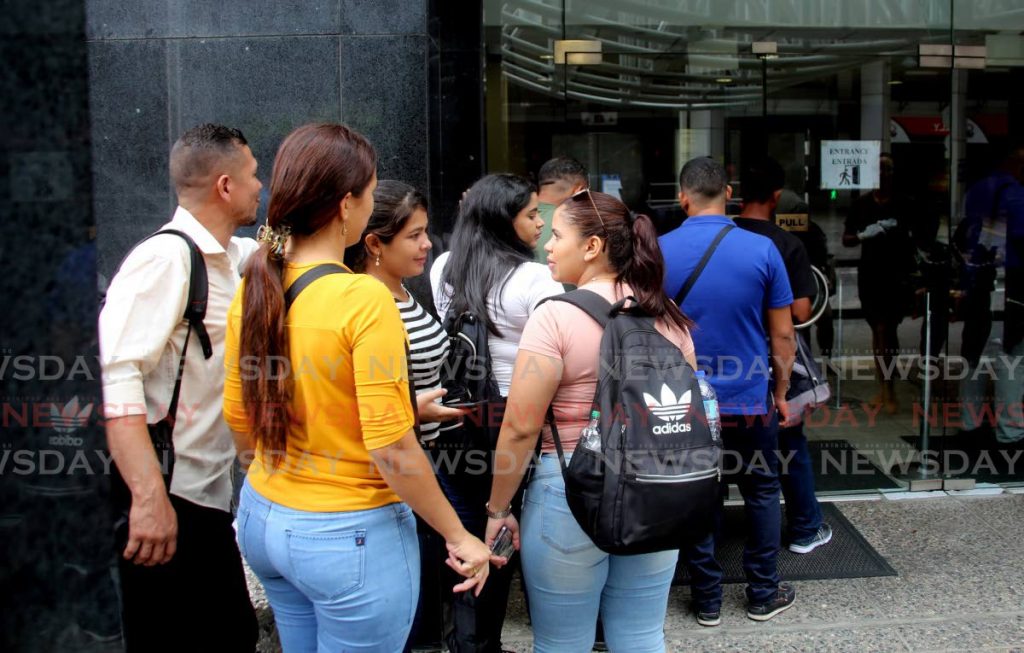Venezuelan migrants ponder returning home

TT's quarantine measures as a strategy to contain the coronavirus pandemic have dealt an emotional and economic blow to the thousands of Venezuelans who are here fleeing the crisis in their country, and now some of the refugees in TT are planning their return home.
Their problems of settling here after being allowed special status in TT began deepening when the Prime Minister announced the closure of bars on March 16, as the first preventive measure of covid19.
A high percentage of Venezuelan men and women worked in bars. Because the source of their livelihood was no more, as they joined the tens of thousands becoming unemployed, their pockets began to feel the pinch.and since then have been without money. They are now desperately seeking to find jobs and try to help their relatives whom they left behind in Venezuela as they searched for a better life here.
Over 16,000 Venezuelans were registered last June giving them an opportunity to work and live in this country legally.
They are literally at the crossroads: the TT economy taking a battering from the effects of covid19, and no let-up in the misfortunes also from covid19 and the political crisis in their homeland. They are faced with difficult decisions.
“I have not had a job for more than a month," said Carmen Pérez, a refugee woman who has been here for 10 months.
"The little I had saved I already spent between food and rent. I have not been able to send money to my family in Venezuela and that worries me even more,” .
Pérez, worked in a bar in Port of Spain and fears that the quarantine for this type of business will be extended.
"I have seen the news from other countries and the bars will continue to be closed due to physical distancing and prevention. That makes me think that I must make quick decisions,"
Among those decisions that Pérez has on the list, returning to her country is first choice.
"If I do not work, I will not have money to buy food, nor to pay the rent for this month, and the owner of the apartment does not want to negotiate any other form of payment. He only wants the money at the end of the month or he will run us to the street."
Hence, his main option is to return home.
"In Venezuela there is no job, the food is incomparable and to that add thousands of social problems, but I have my house and I know that nobody will take me out on the street," said Pérez.
Another big problem that Venezuelans face in TT is the lack of education of their children.
According to data provided by UNHCR in TT, there are currently 2,000 refugee children and none with the possibility of entering the local public education system. Some 600 children are receiving classes through the Equal Place programme with the help of the Catholic Church. However, the lack of news from the government regarding the entrance of their children to local schools raises questions around some Venezuelans having to remain here.
"It is a humanitarian issue," said Juan Carlos Maita. "Venezuelans did not come to TT to stay for life, only to try to work to give food to our families while the problems in Venezuela end and the education of our children is a special case protected by international law and that the TT government does not want to accept. Unfortunately, this TT government does not watch over human rights, so my wife and I are considering going home when the quarantine in Venezuela ends."
Maita considers it necessary to educate her two children, ages 5 and 7.
Like them, there are hundreds of boys and girls who have lost years of their education by not being allowed to undergo their training here.
Before the TT borders were close on March 23 there were reports that the airlines travelling to Venezuela were already managing a waiting list for the purchase of tickets. The vast majority of these people who wait to go to the neighbouring South American country are natives of that country.
Likewise, there is information that the shipping companies are also working with a registry of people ready to travel to Venezuela when the borders of both countries are reopened.


Comments
"Venezuelan migrants ponder returning home"